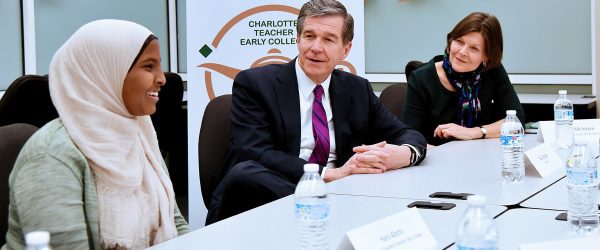Governor explores the importance of teacher training programs

North Carolina Gov. Roy Cooper’s visit to UNC Charlotte on Wednesday, March 13, provided an opportunity for the state’s chief executive to learn more about the Charlotte Teacher Early College (CTEC) and how the University is helping to bolster the teacher pipeline for the region and state.
Cooper visited CTEC, where he participated in an education roundtable with students, teachers, a student-teacher, CTEC Principal Will Leach ’00, Chancellor Philip L. Dubois and Cato College of Education Dean Ellen McIntyre. The governor emphasized that the state’s success depends on a robust public education system and has stated that a quality teacher in every classroom and a quality principal in every school make for great public schools.
CTEC, the only program of its kind in North Carolina and one of the first in the country, immerses Charlotte-Mecklenburg Schools students in intentional field-based learning activities. Coursework develops knowledge and skills required for success in today’s diverse urban classrooms. Students will graduate with a high school diploma, a Certificate of Advanced Standing in Education and a minimum of 60 hours in course credits transferrable to any public institution in North Carolina.
By exposing aspiring educators to important aspects of the profession early, CTEC aims to produce teachers who are prepared to succeed during the critical first years in the classroom. The program, now in its second year, is a partnership between the Cato College of Education and Charlotte-Mecklenburg Schools.
While on campus, Cooper toured the Burson Building. One of UNC Charlotte’s top legislative priorities for 2019 is funding renovations of the Cameron and Burson buildings, to increase lab and classroom space for fast-growing fields including STEM, computing and informatics, engineering and other physical sciences. The governor’s recently released budget proposal includes a $4 billion bond program with $20 million for the renovations of those facilities.
Cooper and key legislative leaders are addressing these issues in upcoming budget proposals, especially as they relate to STEM and science programs.
